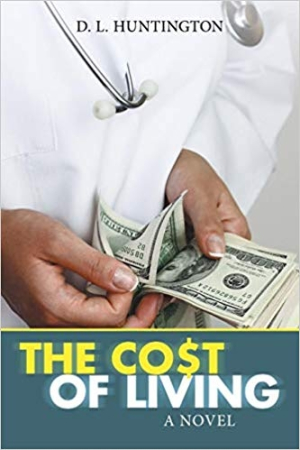The Cost of Living
The Cost of Living is an occult thriller that emphasizes its wholesome moral compass.
D. L. Huntington’s occult-tinged thriller The Cost of Living is an excellent contemporary parable about the sickness of America’s wealth disparity.
Rhonda Wells comes from wealth and privilege, but makes a show out of disdaining her parents and their opulent lifestyle. After graduating from college with a journalism degree an a deep devotion to liberal politics, Rhonda decides to write articles under the byline Rhonda Rhodes. As Rhodes, she exposes the terrible conditions that homeless people endure on New York’s cold, cruel streets, as well as the terrible reality behind the Beau Monde Society.
In her career, Rhonda battles public indifference and the staunch conservatism of the NYPD, especially that of Commissioner Garth Kruger, not to mention the machinations of the Beau Monde Society, which caters to, even worships, the rich. The Society’s devotion rituals include human sacrifice; most of their victims coming from New York City’s homeless population.
Themes are made apparent early on. The story is rooted in concepts like liberal naiveté, coldhearted conservatism, the awful nature of America’s wealth gap, and the dangers of substituting Christian morals and charity for debased greed. The main characters are attached to such tropes; Rhonda and Garth are polar opposites on the political divide. They also propel the action and are built in a dimensional way. Rhonda’s desire to help those who are less fortunate is genuine; Garth’s hard-boiled view of the world is detailed with sympathy. Only the Beau Monde Society villains are shorted; depicted as creeps and cretins, they have considerable money and pure utilitarian ideas about who matters and who doesn’t.
The book traffics in big and religious messages; within it, all lives are worth something to God, the rich are no better than the poor, and any society that worships money worships a false idol. These messages are delivered without subtlety, though, in a story that is itself cut and dry—linear, ably paced, and predictable. It is populist entertainment that works to instill its own ethical sensibilities in its audience. Stripped-down language and compact chapters move the story forward; it feeds on action and lots of dialogue, working toward an ending that is satisfying in its logic, if short on depth.
The Cost of Living is an occult thriller that emphasizes its wholesome moral compass.
Reviewed by
Benjamin Welton
Disclosure: This article is not an endorsement, but a review. The publisher of this book provided free copies of the book and paid a small fee to have their book reviewed by a professional reviewer. Foreword Reviews and Clarion Reviews make no guarantee that the publisher will receive a positive review. Foreword Magazine, Inc. is disclosing this in accordance with the Federal Trade Commission’s 16 CFR, Part 255.

